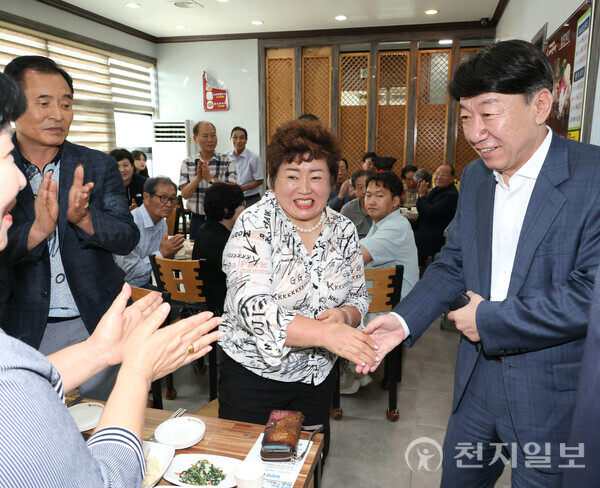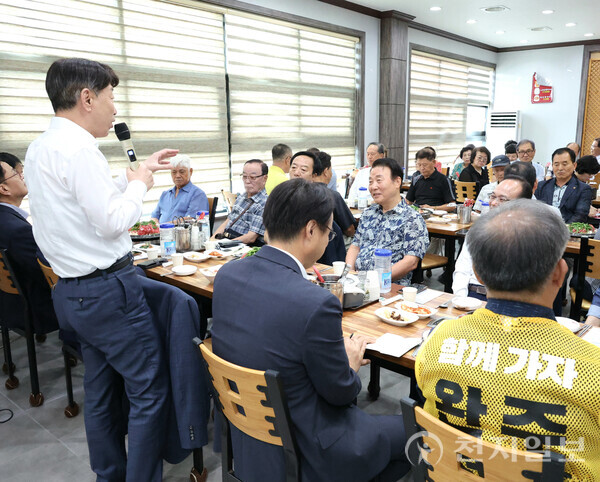Concerns linger over welfare cuts, fiscal burden
Hopes for commerce clash with regional unease
Coexistence pledges fail to dispel distrust
Skepticism spreads over political leadership
Restoring public trust emerges as key task
![[Cheonji Ilbo Jeonbuk=Reporter Kim Dong-hyun] The Jeonju–Wanju integration debate has reignited, but with concerns over welfare cuts and debt burdens deepening public distrust, restoring political trust has emerged as the top priority. Photo shows a banner at Samnye Market. ⓒCheonji Ilbo, Sept. 5, 2025.](https://cdn.newscj.com/news/photo/202509/3314113_3390279_1728.jpg)
[Cheonji Ilbo Jeonbuk=Reporter Kim Dong-hyun] The debate over the integration of Jeonju and Wanju has reignited, putting Jeonbuk Province and Jeonju City’s ability to manage and persuade on trial. Although Jeonbuk Province and Jeonju City accepted the “105 coexistence development plans” proposed by the integration promotion group and promised to push for legislation, distrust over reduced benefits and avoidance of responsibility remains strong on the ground. Resident interviews and recent local opinion polls reveal both divided public sentiment and conflicting evaluations of leadership.
◆“Will welfare shrink, and only debt remain?”
Many Wanju residents fear integration could bring more losses than gains. A strong perception persists that maintaining the current system is preferable, given concerns they may shoulder Jeonju City’s financial debt burden.
Song Jeom-rye (alias, 77), who runs a clothing and bedding shop in Bongdong, said, “Wanju has many benefits. There’s a lot of support for childbirth, and flood damage is less frequent, so it’s a good place to live. That’s why people can’t help but dislike integration.” She added, “For Bongdong’s development, integration may be necessary, but in truth, I’d rather it not happen. Most of my customers say they don’t want it either.”
Kim Gap-san (alias, in his 70s), who operates a clothing store, said, “It’s true that someday, for the sake of Jeonbuk, we’ll need to integrate.” However, he added, “People worry Jeonju has too much debt. Many fear they’ll lose current benefits if integration happens.”
A pesticide shop owner in Samnye voiced opposition tied to welfare and finances: “Since the COVID days, Jeonju hasn’t given a single penny in support, but Wanju has provided solid aid. They gave 300,000 won before, and now there’s talk of another 1 million won per person. If we merge, that won’t continue,” he said. “Wanju has no debt, but Jeonju is drowning in it. They’ll use Wanju’s money to pay off Jeonju’s debt. Ninety percent of Wanju residents oppose this,” he asserted.

◆Expectations for growth vs fears of marginalization
Residents’ views on integration diverged along lifestyle and economic interests. Some in commercial districts supported integration, citing growth prospects tied to Jeonju, while others opposed it, citing fears of being relegated to the periphery or hosting unwanted facilities.
Park Jang-il (alias, 72), who runs an electronics shop in Samnye, expressed support from a business perspective: “I’m in favor. In Samnye, most shopkeepers are in favor,” he said. “All the students go to schools in Jeonju. Parents commute from Samnye to Jeonju for school districts, so it only makes sense to integrate.” He added, “Jeonju is hemmed in by Wanju and can’t expand. For integration, Wanju also needs a plus. It shouldn’t be unconditional integration.” He further noted, “Opponents seem to be blocking supporters from speaking up.”
Song Kang-hyeok (alias, 39), who operates a clothing store in Samnye, supported integration from a long-term perspective: “In the long run, integration is right. This isn’t purely a Wanju market—many Jeonju customers come here too,” he said. “At first, support for integration was stronger, but recently opposition has grown. I saw leaflets being handed out in Bongdong urging people to oppose. Residents need to be persuaded.”
Kwon Geum-nae (alias, 69), who runs a repair shop, voiced concerns about marginalization and development priorities: “Since Wanju surrounds Jeonju, integration makes sense for Jeonju. But Jeonju has only expanded toward Hyocheon-dong and Seosin-dong. If we integrate now, Wanju will just become the outskirts,” she said. “Before, people clamored to move into Bongdong’s Coaru apartments, but now with new housing in Songcheon-dong, prices have dropped. After Iksan integrated, Hamyeol declined.”
She added, “Wanju is mountainous. Will they just build more housing? Eventually they’ll dump unwanted facilities here. They talked about integration 50 years ago, but now, when Jeonju has already expanded, rushing this feels wrong.”
◆Coexistence pledges, but distrust persists
Jeonbuk Province and Jeonju City promised to legislate the 105 coexistence development plans proposed by the integration group. These included: a ban on relocating unwanted facilities without Wanju residents’ consent; maintaining and expanding Wanju residents’ benefits for more than 12 years; guaranteeing at least 11 Wanju district council seats for 12 years; and building the new integrated city hall and council chamber in Wanju.
Yet distrust remains. Opinion polls confirmed the opposition trend. A Daily Research poll (commissioned by Wanju Shinmun) conducted on August 1–2 found 71.0% opposed and 25.9% in favor. Another Korea Information Research poll (commissioned by K Journal) on July 23–24 showed 65.0% opposed and 30.7% in favor among Wanju residents.

◆Divided public, political trust as the variable
The conflict over integration has spilled into evaluations of political leadership. Residents’ views on the governor and Jeonju’s mayor were mixed, while the Wanju county head also faced criticism.
Song Jeom-rye said, “The governor is trying hard—you can see the effort. But I don’t know what Jeonju’s mayor is doing.”
Kwon Geum-nae recalled, “The governor recently came to a church in Samnye. But I was so disappointed—he didn’t greet anyone, just looked around from the center. It was pitiful.”
Questions of responsibility also arose. Kim Gap-san said, “Talk of integration only happens at the top, not at the level where farmers and residents feel it. People worry leaders will just talk, push through integration, and then do nothing.” He added, “If integration goes through but next year’s elections change the governor, mayor, or county head, everything collapses. Who takes responsibility then? Trust is eroding.”
Another shop owner declared, “Wanju is entirely opposed, so how can polls show 35% in favor? The survey was rigged. People are saying, ‘The Jeonju mayor piled up debt and now wants Wanju’s money to pay it off.’ ‘Making Jeonbuk a Special Autonomous Province only lengthened its name but brought no benefits.’ ‘The governor is just posturing.’ People dislike both the governor and the mayor.”
For now, the Jeonju–Wanju integration debate remains stalled, unable to win residents’ trust. Residents continue to cite fears of reduced benefits and political distrust. Ultimately, success hinges less on legal or institutional measures and more on restoring trust. Unless leaders listen to residents’ voices, the integration debate risks drifting once again.
- [전국인사이드ㅣ전북] 통합 논의, 지도자 리더십 시험대… 주민 신뢰는 회의적
- [창간 16주년 기획] 군비로 버티는 농촌 의료… 작은 의료원의 무거운 짐
- [전국인사이드ㅣ전북] 전주·완주 통합 갈등 30년… 행정 효율·자치권 사이 줄다리기
- [1분컷] 통합 논의, 지도자 리더십 시험대… 주민 신뢰는 회의적
- [1-Minute Cut] Integration debate tests leadership… Residents skeptical of trust
- [National InsideㅣJeonbuk] 620 Billion Debt Fuse… Integration Shaken Amid Distrust
- [1-Minute Cut] 620 Billion Debt Fuse… Integration Shaken Amid Distrust

